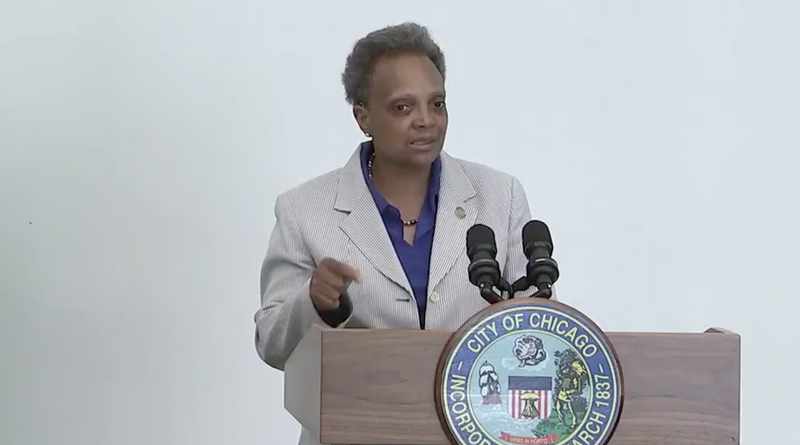
CHICAGO (WBBM NEWSRADIO) -- Mayor Lightfoot, The Resurrection Project and Open Society Foundations announced Wednesday a new cash assistance program for Chicago residents.
The program is called the “Chicago Resiliency Fund” and is an up to $5 million cash assistance program to support the more than 300,000 Chicago residents who were excluded from federal stimulus aid in response to COVID-19.
"A multi-million dollar [fund> developed in partnership The Resurrection Project and generous donors, like the Open Society Foundations, and others all towards providing vital financial support to over 300,000 Chicagoans unable to benefit from federal financial stimulus by providing $1,000 per household for eligible Chicagoans," Mayor Lightfoot said, which includes, but is not limited to, undocumented individuals, mixed-status families, dependent adults and returning residents.
"We are able to do this because of the passion and foresight of our city partners, who saw a problem and stepped up in a big way to creating a solution. This announcement today has literally been weeks and weeks in the making," she said. "I am so glad that we are finally able to say it's here, we are going to provide these supports."
The Mayor said this is not just a "one-and-done announcement. To every Chicagoan looking for ways to help your fellow residents, and I get that question all the time. Our neighbors, our brothers and sisters, are struggling. This is an important additional way that you can support. You can chip in now by donating to the Chicago Resiliency Fund" online.
The Mayor wrote in a statement, “This fund serves as a critical resource for the thousands of Chicagoans who so sorely need support and relief from the impact of COVID-19, but are unable to receive it through the federal government’s own stimulus channels. As part of my fight to mitigate the effects of economic hardship and poverty in Chicago, I know that what people struggling right now need is money, and this fund will get them just that to make ends meet. I applaud The Resurrection Project and the Open Society Foundations for taking such bold action for our communities, especially during this time of unprecedented need. We will get through this crisis together, and I look forward to continuing our shared mission to revitalize our neighborhoods and ensure every resident has access to all the opportunities our great city has to offer.”
The Mayor's Office said the Resurrection Project, a longstanding nonprofit organization committed to creating healthier communities throughout Chicago, will serve as the lead fiscal agent for the Chicago Resiliency Fund. The Resurrection Project will convene a diverse group of community-based organizations to conduct outreach and identify households excluded from the federal stimulus relief, to ensure as many eligible Chicagoans participate as possible.
Cash issuance will begin in mid-June. More information on the Chicago Resiliency Fund, including updates on launch date, ways to apply for assistance and ways to donate to the fund, can be found online.
"The COVID-19 crisis has families across our communities fighting for their health, economic well-being, and lives. Thousands of families are struggling financially as a result of not receiving any federal stimulus funds. Now, more than ever it is critical to protect the safety, health, and economic well-being of all residents. We applaud Mayor Lightfoot and the City of Chicago for standing with all communities to support financially burdened individuals and families during this national emergency regardless of immigration status,” said Raul Raymundo, CEO of The Resurrection Project, in a statement.
Realizing the critical need to support all of Chicago’s residents, a group of funders came together, including the Open Society Foundations, to help establish the Chicago Resiliency Fund.
In response to COVID-19, the Open Society Foundations has committed more than $130 million to combat the ravages of the virus around the globe, with a focus on providing immediate relief for vulnerable communities. Chicago received $1 million from the Open Society Foundations, which was the second-largest single donation from the organization for these efforts.
“The COVID-19 pandemic has revealed the role that essential workers, especially undocumented immigrants, play in our society. This is now finally recognized by almost everyone – but not, unfortunately, by the federal government, which has excluded millions from emergency relief – including US citizens. The Open Society Foundations commends the City of Chicago for standing up for these essential workers and their families. We are enormously grateful to the anonymous donor who has stepped in with an additional $4 million to support essential workers, and we look forward to a day when essential and undocumented, workers are included in federal relief packages,” said Patrick Gaspard, president of the Open Society Foundations, in a statement.
According to the Mayor's Office, this fund will serve a critical role in supporting individuals and families – many of whom tend to reside within the communities that have been most adversely impacted by COVID-19 – who could not safely shelter in place, whose employment did not allow for remote work, or who may have lost their employment, but are not eligible for unemployment insurance.
Word of this fund comes a day after the Mayor announced that the city faced a projected budget shortfall of $700-million for this year, including $175-million lost while sheltering-in-place in March and April. She warns that the gap could grow if there is a COVID-19 resurgence.
Mayor Lightfoot said to plug the hole property tax increases are not off the table.
"The last things we are looking to, after we have exhausted everything else will be property tax increase and layoffs," Lightfoot said. "I hope we don't get to that point."
